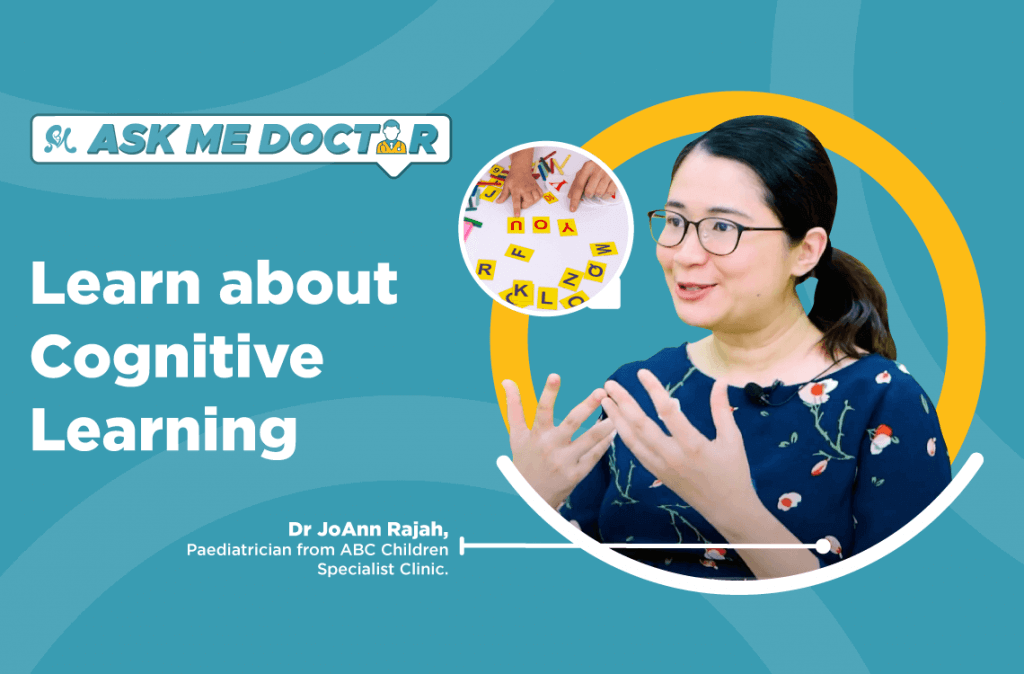Understanding your children’s cognitive development can help you make better decisions on choosing the right activities for them, to help boost their remembering, learning, and also, reasoning abilities.
Cognitive growth in early childhood refers to your child’s mental capacity for problem-solving, language acquisition, and also, the ability to understand the objects and the relations around them.
In other words, it is very important to form the foundation of many of the other skills that your child will have later on in their life.
Today, we will be talking to Dr. JoAnn Rajah, a paediatrician from ABC Children Specialist Clinic to understand better about early cognitive development among children, specifically toddlers from the age of one and above.
Q1: Averagely, at what age does my child start to develop his cognitive skills?
Dr. JoAnn: First and foremost, we need to know what cognitive development is all about. Cognitive development includes skills, such as thinking, learning, exploring, and problem-solving.
In conclusion, it is the foundation of intelligence.
Seeing a child growing up and developing new cognitive skills is undoubtedly exciting for all parents. It is important to note that children start to grow and develop their skills rapidly in the first two years of their lives.
Q2: What is the milestone of a child’s cognitive development, in general?
Dr. JoAnn: From the age of one, children will start to imitate the actions and languages of adults.
Also, they will learn to understand and respond to words and point out familiar objects. By the age of two to three years old, children tend to become more independent. By then, they should be able to imitate more complex actions like playing house, matching objects with their uses, and listening to simple instructions from parents.
At the age of four years, children start to take a more active role in learning. This is where they begin to ask ‘why’.
Why this? Why that?
All for the sake of getting more information. They also start to maintain an attention span of five–fifteen minutes.
By the time children reach the age of five years, they become better at communicating, counting, and accomplishing essential skills that will help them prepare for school.
Q3: What are the factors that slow down the development of one’s brain?
Is there any reason if my child’s development is a bit behind the schedule or behind this milestone?
Dr. JoAnn: So, studies have shown that nutritional deficiencies, infectious diseases, and certain environmental exposures, for example, exposure to heavy metals, exposure to violence, or lack of cognitive stimulation, can prevent a child from achieving their full cognitive potential.
Q4: As a parent, what can I do to promote my child’s cognitive development?
Dr. JoAnn: As we now know the factors that can slow down a child’s cognitive development, avoiding or preventing them would be the key.
Therefore, all children should receive adequate nutrition, be raised in a healthy and safe environment with good parent-child relationships, and of course, have fewer sick days.
Q5: Would you suggest any activities that can help increase children’s cognitive development?
Dr. JoAnn: Well, just play!
Play is the key to a toddler’s cognitive development because children learn through play.
Parents who play with their children would foster a better relationship. Thus, enhancing their cognitive development.
Also, here are some good activities to stimulate a child’s cognitive development:
- Reading
- Solving puzzles
- Arts and crafts
- Drawing
- Sorting
- Playing outside
Q6: What are the nutrients that can help my child to learn faster?
Dr. JoAnn: Naturally, every child should have an adequate and well-balanced diet to support their growth and development.
However, there are certain essential nutrients that are important for brain development, such as:
- Lutein
- Omega Fatty Acids
- DHA
These three help in improving brain processing speed.
Children who receive sufficient 2’-FL are also found to have higher cognitive scores. Not only that, but 2’-FL also helps to support the immune system; leading to fewer sick days.
Some final words from Dr. JoAnn;
Now, the other thing would be natural Vitamin E, which is also gaining recognition in supporting healthy brain development.
Childhood is a critical and sensitive period for cognitive development. Factors that can disrupt brain development during these crucial years may have lasting consequences in the future.
Hence, laying a good foundation is important to ensure that every child develops to their maximum capacity.
By saying that, it should start from when they are still a toddler. One of the recommended ways is to supplement your child with a good formula milk, in order to support their cognitive development and Similac Gain Plus® Gold is the perfect choice for that!
Similac Gain Plus® Gold is recommended for toddlers age one to three years old. It is formulated with 2’-FL and Eye-Q® System that help with the building blocks of your child’s well-being, as well as strengthening their immune system from within.
The Eye-Q® system contains a unique blend of Lutein, Natural Vitamin E, and DHA that helps with the overall brain development to keep your child learning well and strong.
Not to mention, Similac Gain Plus® Gold is the world’s first formula that contains 2′-FL, which nourishes the child’s first line of defence system in their gut.
Looking forward to more experts’ answers and recommendations? Stay tuned to our next episode of AskMeDoctor! and don’t forget to visit Similac Gain Plus® Gold‘s official website to redeem a FREE Similac Gain Plus® Gold sample today!
